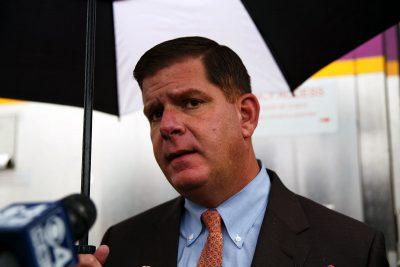Boston Mayor Marty Walsh was appointed Monday to serve as chair of Climate Mayors, a nationwide coalition of municipal leaders implementing climate-conscious policies.

Walsh will take over for Los Angeles Mayor Eric Garcetti as a leader of 468 mayors who work toward fulfilling the standards outlined in the Paris Climate Agreement within their respective cities, in wake of the federal government’s withdrawal.
“I’m very proud to be named chair of the Climate Mayors,” Walsh said in a City press release. “As we welcome in a federal administration committed to urgent, bold climate policies, the Climate Mayors are looking forward to accelerating our efforts.”
The mayor’s implementation of a Climate Action Plan is underway. The strategy is meant to set Boston on track to be carbon neutral by 2050.
“We see how climate change is already impacting the residents in our cities, and we know how important it is for us to take decisive action for the sake of public safety and public health,” Walsh said in the press release.
Ben Hellerstein, state director for Environment Massachusetts, said Walsh’s rise to the national stage on the issue is “exciting.”
“I hope that Mayor Walsh’s leadership of Climate Mayors will be the catalyst for a lot of good work on clean energy and climate change,” Hellerstein said, “both in Boston and across the country.”
Some of that work has begun in Boston. As per the August update to Walsh’s Climate Action Plan, all newly constructed municipal buildings owned by the City must emit zero carbon emissions.
These standards, according to the City’s plan, would have the expected effect of removing up to 17,000 tons of annual carbon emissions from municipal activities.
Hellerstein said Boston is currently experiencing the impacts of climate change, as evidenced by the flooding of some coastal areas caused by king tides.
“We know that as sea levels are rising, as extreme storms are becoming more frequent and more severe,” Hellerstein said. “It could get much worse from here.”
Hellerstein said relationships between activists and the Mayor’s Office have often been “kind of a push and pull.”
“The City’s Community Choice Electricity program is a pretty key example where the mayor. I think, has now become a champion for it but he really wasn’t pushing it for a long time,” Hellerstein said. “We need all hands on deck to achieve the kind of transformations that we need to see over the next few years.”
City Councilor Michelle Wu, a 2021 candidate for mayor, is among Boston’s elected officials pushing for a climate-aware policy, according to Northeastern University public policy and urban affairs professor Joan Fitzgerald.
“She’s been critical of the mayor on a number of fronts, but one of them has been on climate leadership,” Fitzgerald said. “This positions him very well in terms of countering that and saying, ‘What do you mean climate leadership? I’m the chair of the Climate Mayors Coalition.’”
Fitzgerald said the coalition’s requirement for cities to meet certain thresholds to retain their membership is unique.
“Cities were implementing what I called random acts of greenness, an initiative here, an initiative there, but it really didn’t add up to anything,” Fitzgerald said. “But this really pushes the City.”
While the Climate Mayors Coalition has implemented climate-aware policies, Fitzgerald said a federal sustainability strategy is necessary.
“The idea that cities can solve the climate crisis on their own without there being a national policy to support that, that’s not going to happen,” Fitzgerald said. “You need both.”
Jennie Stephens, director of strategic research collaborations at the Global Resilience Institute at Northeastern University, said climate action plans in cities like Boston are becoming increasingly innovative.
“How we respond to climate and climate justice is intricately linked to racial justice and economic justice in our cities,” Stephens said.
More so than in some other cities, Boston remains very segregated, according to Stephens, with vast disparities.
“We, in Boston, still have a long way to go in terms of being considered a leader,” Stephens said, “in terms of connecting our responses to climate with social justice and social policies and racial justice and economic justice.”






















































































































Megan • Nov 25, 2020 at 11:59 pm
So well written!!